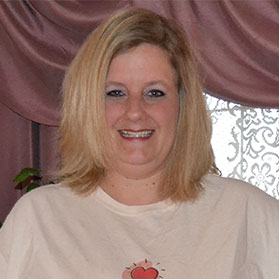- Conditions & Care
- Disease & Symptom Information
- Heart
- Service Line
- Treatments
Heather Defies the Odds and Now Cherishes the Small Things

After having flu-like symptoms for several weeks, 33-year-old Heather Dennis finally experienced a grave warning sign early one morning that led her to immediately call for help: She couldn’t breathe. “I felt like there was a ton of bricks on my chest,” she vividly recalls. Heather was in congestive heart failure.
An Unexpected Phone Call
Instantaneously she called her friend Tasha Thompson, a registered nurse, who drove her to an urgent care located near Heather's Delhi Township home.
“She called me Sunday morning and said, ‘I can’t do this anymore,” Tasha remembers. “I knew it wasn’t good.”
“I really, honest to goodness, believed that if you’re going to the ICU, you’re going there to die.” – Heather Dennis
The doctor informed Heather that her blood pressure was high and instructed her to get X-rays on her lungs and have blood drawn at the closest hospital.
Tasha drove Heather to Mercy, “the closest hospital to us,” Heather points out. “Mercy gave me a disc to take back to him [her urgent care doctor] … and they said they would send the labs over to him because he ordered them stat.”
As soon as Heather's doctor reviewed the X-rays, he called Heather back to the office to show her how much fluid was surrounding her lungs and said she needed to go to the hospital because she was in heart failure.
“I asked him if I could go home, pack a bag and kiss the kids and my husband … because I didn’t know what was going to happen,” she says.
Heather’s Care Team Eases Her Anxiety
From there, Tasha drove Heather to Good Samaritan Hospital’s Emergency Department. “I didn’t realize how serious it was until I got to Good Sam … The lady came in and told me I was going to the ICU [intensive care unit],” she says. “I really, honest to goodness, believed that if you’re going to the ICU, you’re going there to die.”
Doctors informed Heather she was at an 18-percent heart function and was in congestive heart failure, which was caused by Peripartum cardiomyopathy (PPCM), a rare heart disorder she developed eight weeks after delivering her third child.
She spent six days in the ICU, where she was put on several medications to help release the fluid around her heart and lower her heart rate.
Heather appreciates how attentive and compassionate her care team was during her stay in the ICU. “It just felt like, in that short amount of time, I had a whole family … I have a really bad anxiety problem and normally I never would have been comfortable staying in the hospital by myself. Period,” she explains. “I stayed in the hospital two nights by myself because I was comfortable enough with my nurses. I felt like they were my friends … they were all pulling for me.”
A New Outlook on Life
While many people never recover from PPCM and some patients require heart transplants, Heather is happy to report she has completely recovered.
Initially, Heather met bi-weekly with TriHealth Heart & Vascular Institute cardiologist Freidoon Ghazi MD. He put her on a low-sodium diet for several months and monitored her weight closely to make sure her lungs weren’t filling up with fluid again. “I had to write down my weight everyday … if I gained two or three pounds he wanted me to call him right away.”
A year after being cleared, Heather only meets with Dr. Ghazi for annual check-ups. “I love him!” she gushes. “He’s very good – very serious – but, you know, I joke around with him.”
Now, more than two years after her initial scare, Heather appreciates life’s most precious moments. “I’m here for my kids. I’m here for my husband. I live every day like it’s my last, because I honestly was almost at that point.”
Related Articles
- Genetic Testing
- Heart
- Service Line
- Treatments
- Community & News
- Heart
- Patient Stories
- Service Line